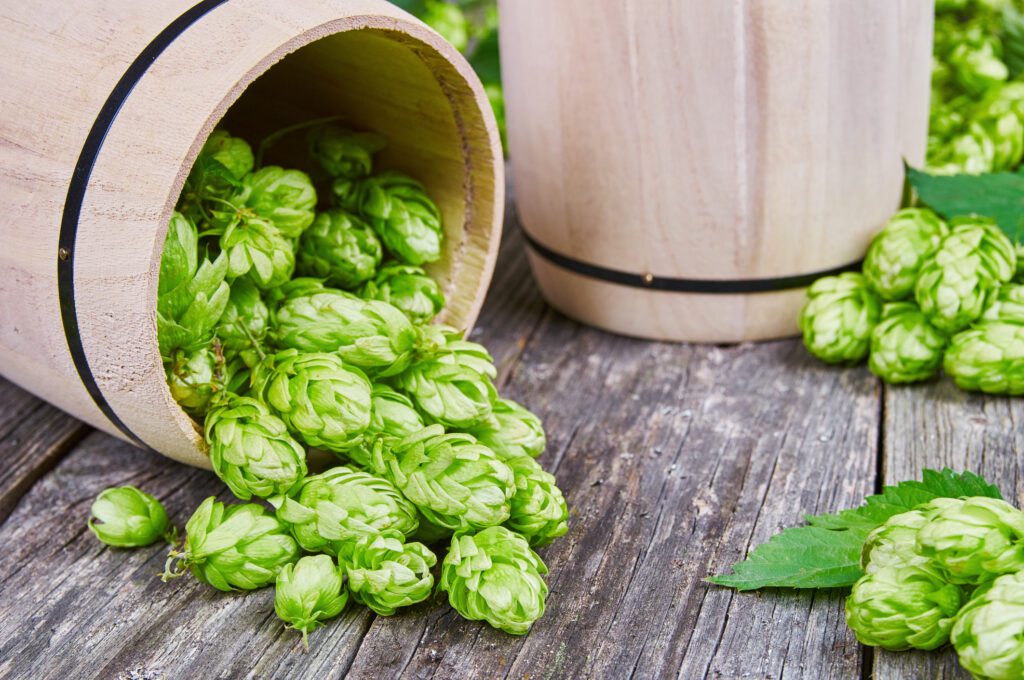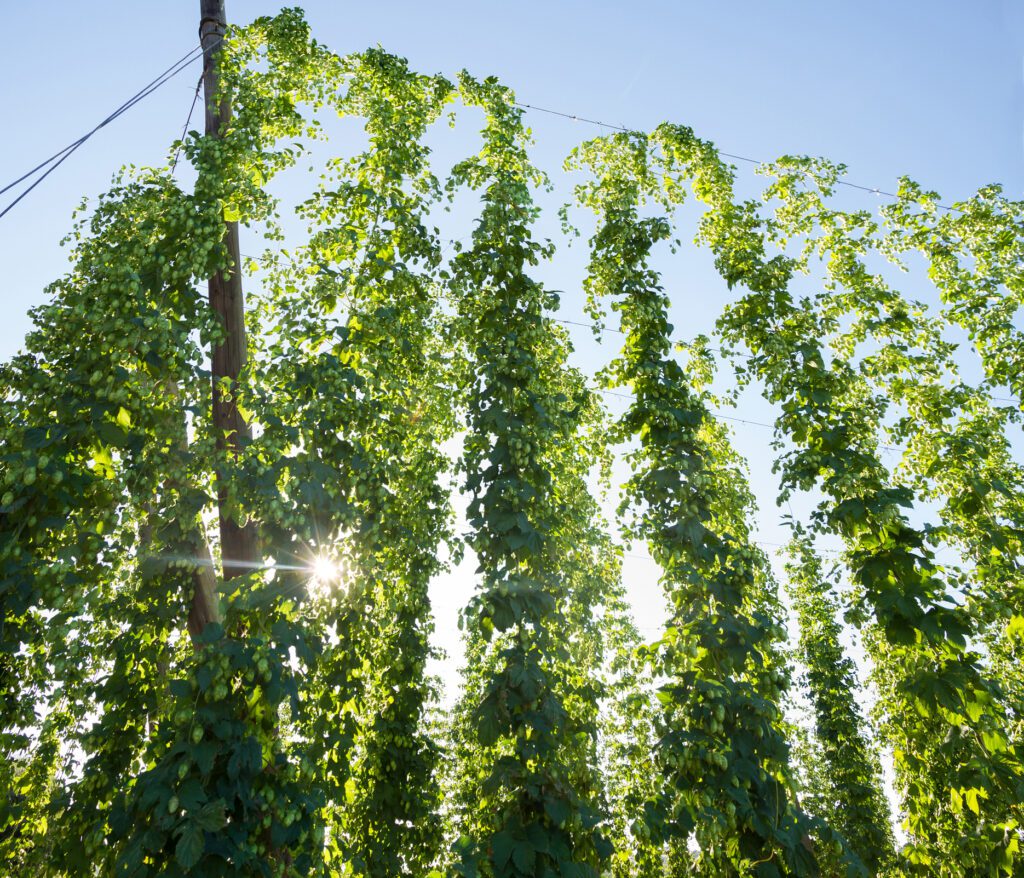Weight-Loss Benefits from a Natural Herb – Bitter Hops: Multiple Human Studies Show Significant Results
It is a well-known fact – weight loss resistance and climbing pounds on the scale are a world-wide, but primarily, first world problem. The incidence of adult obesity has doubled in the past 25 years in North America. As of 2022, 1 in every 8 adults is classified as obese. Even more than this, nearly 50% of the global adult population meets the clinical definition of overweight.
So why is this?
Well, there are many reasons, but perhaps one you may not have realized. Our appetites have evolved for a world of scarcity up until the late 20th century. Our mind does not realize that our stomach is full until about 40 minutes after eating. This is how long it takes for the GLP-1 signals from our digestive tract to be released and travel to the brain. This was fine when we were hunter gatherers, before the world of abundance and calorie-dense foods. Today, it is all-too-easy to consume many more calories than nature ever intended before knowing we have had enough.
This is also why the Semaglutide medications such as Wegovy and Ozempic have been so effective in promoting weight loss in patients who really struggle. But not everyone is a candidate for these medications and not everyone wants to take an injection or a prescription drug for their weight loss resistance. Lucky for us, we have a new kid on the block with some promising research.
When you think of hops, you probably don’t think of weight loss. Primarily used as a flavouring agent in beer, hops are associated more with weight gain if anything. But a proprietary extract of hops known as Amarasate® is changing that opinion. We now have three recent double-blind randomized, controlled studies show that this proprietary extract of hops may actually help ease hunger, quell food cravings, and help people lose weight.
Study 1

The first study, which was published in November 2019 in the journal Nutrients, followed 30 healthy men who completed a 24-hour water-only fast. The test was performed on three separate occasions. Participants were randomly assigned to receive one of two different concentrations of Amarasate® hops flower extract (500 mg or 200 mg) suspended in canola oil, or a placebo. All treatment groups received two capsules at 16 hours into the fast, and two more at 20 hours in. Subjective measures of appetite (i.e. hunger, fullness) and nausea were recorded by having participants mark a range of responses to questions such as “How hungry do you feel” and “How much do you think you could eat.” These assessments occurred every 30 minutes from the time the first capsules were given (16 hours) to the end of the 24-hour study period.
The researchers’ analysis showed that from hours 18-24 of the fast, both the high-dose and low-dose treatment groups exhibited up to a 25 percent reduction in hunger. Additionally, the expected lunchtime increase in hunger that was present in the placebo group was absent in both treatment groups. “These data suggest that appetite suppressant co-therapy may be useful in reducing hunger during intermittent fasting, and show that bitter compounds may regulate appetite independently of meal timing,” the researchers wrote in their conclusion.
Study 2
The second study, published in March 2022 in the American Journal of Clinical Nutrition, tested whether the hops extract had an effect on caloric intake, appetite, and hormonal responses. It followed 19 healthy men who were randomized into three groups. One group received 500 mg of Amarasate in time-release capsules at 11:00 AM, another received 500 mg of Amarasate® in quick-release capsules at 11:30 AM, and the third received a placebo. Participants’ caloric intake was recorded at lunch (noon) and afternoon snack (2:00 PM) times, with blood samples taken and subjective ratings of appetite, gastrointestinal (GI) discomfort, vitality, meal palatability, and mood assessed throughout the day.
Analysis of the blood samples concluded that both treatment groups experienced an increase in plasma concentrations of appetite-suppressing hormones CCK, PYY, and GLP-1 of six times over baseline and twice the normal post-prandial release of gastric hormones. Additionally, participants in both treatment groups experienced an average 18 percent reduction in calorie intake during the lunch and snack period.
Study 3
The third study, published in 2024 in the journal Obesity Pillars, showed similar results in a female clinical trial. It followed 30 healthy adult women who adhered to a water-only fast for 24 hours. Afterward, participants were allowed to eat all they wanted of a rice-based meal to break their fast. Participants were randomized into groups that received either 250 mg Amarasate®, 125 mg Amarasate®, or a placebo twice daily during their fast (at 16 and 20 hours). The test was performed on three separate occasions.
Like the previous trial involving men, the women were asked to rate symptoms such as hunger and nausea every 30 minutes after they received their first treatment until the end of the study period. Analysis showed that participants in both treatment groups again experienced less hunger and fewer food cravings. In this case, the women experienced a 100 percent reduction in change in hunger and a 120 percent reduction in change in food cravings, which equates to a 30 percent reduction in hunger and a 40 percent reduction in overall food cravings overall. Additionally, participants in the treatment groups experienced a 14.3 percent decrease in rebound eating after the fast.
“We have previously shown that capsule-based GI delivery of an extract of bitter hops can reduce food intake, suppress appetite, and stimulate the release of appetite-suppressing gut hormones in healthy males,” the researchers wrote. “This current study shows for the first time that a bitter hops can suppress appetite and can [also] reduce cravings for food in females.”
In their conclusion to the 2024 study, the researchers noted that the evidence in favor of Amarasate® hops extract as a weight-loss aid continues to mount. “The results presented here support the effectiveness of this bitter hops extract as an appetite suppressant…and suggests a role in the suppression of food cravings. This is a growing body of work supporting the concentrated GI bitterness on acute appetite measures, laying the scientific bases for longer-term weight loss studies to be conducted on overweight individuals.”
If you are considering medication for weight loss but have reservations about starting down the expensive and long term commitment of injectable prescriptions – you may want to consider taking a natural product that has been shown to be clinically effective. Or, if you have had good success on the injectible prescriptions, but would like to discontinue without the risk of re-bound weight gain, this may be a great option for you.
To learn more about this particular hops extract and how to support and maintain a healthy weight, call our office or visit us on line and book your appointment today.
In Summary
- 30% Reduction in hunger in an hour.
- 40% Reduction in cravings in an hour.
- 18% Reduction in calories consumed after an hour.
Resource: https://todayspractitioner.com/
Study References:
- New Zealand Bitter Hops Extract Reduces Hunger During a 24h Water Only Fast. Nutrients 2019, 11 (11), 2754
- Gastrintestinal Delivery of Bitter Hops Extract Reduces Appetite and Food Cravings in Healthy Adult Women Undergoing Acute Fasting. Obesity Pillars 2024, 100117
- An Extract of Hops (Humulus Lupulus L.) Moderates Gut Peptide Hormone Secretion and Reduces Energy Intake in Health-Weigth Men: A Randomized, Cross Over Clinical Trial. The American Journal of Clinical Nutrition 2022, 115(3), 925-940.
Courtesy of Dr. Emina Jasarevic, ND

